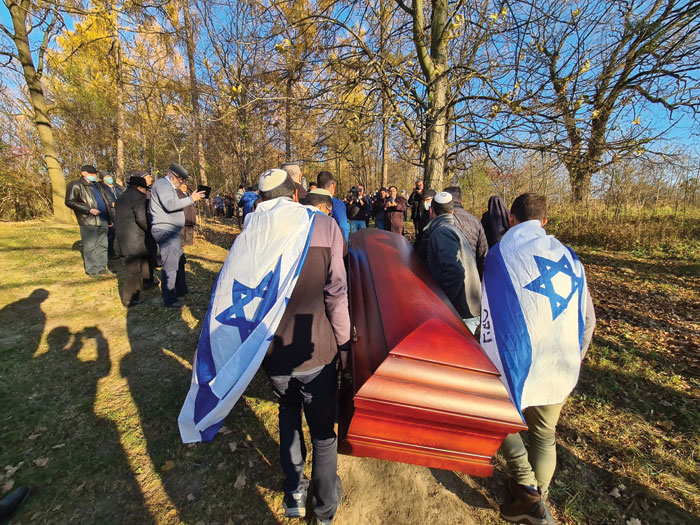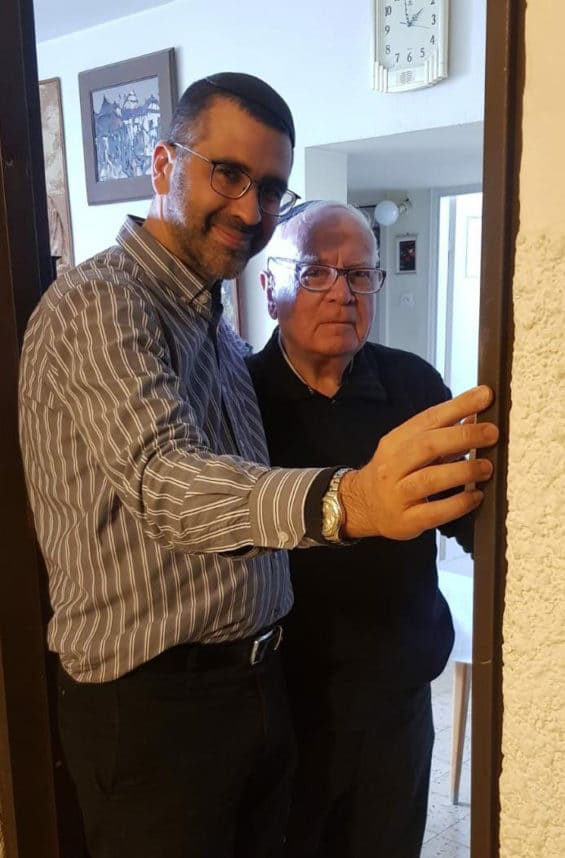 Photo courtesy of AMIT
Photo courtesy of AMIT In 1931, Grzegorz Pawłowski was born into an Orthodox Jewish family in Zamosc, Poland. When he was eight years old, he was placed in a ghetto. The Nazis took his father into forced labor and he was never seen again. His mother and sisters were subsequently murdered.
Pawłowski ended up in a Roman Catholic orphanage, which saved his life. When he got older, he became ordained as a priest and immigrated to Israel, where he worked with Roman Catholic communities for more than three decades.
When Pawłowski went back to the mass grave where his family was buried in Izbica, Poland, he left a plaque that stated, “I abandoned my family in order to save my life at the time of the Shoah/They came to take us for extermination/My life I saved and have consecrated it to the service of God and humanity.”
Over 10 years ago, Rabbi Shalom Malul, dean of AMIT’s Yeshiva High School Ashdod in Israel, noticed the plaque while on a school trip to Poland.
“I was exposed to [Pawłowski’s] story, and when I returned to Israel I was very, very curious and I wanted to meet him,” said Malul. “I got ahold of his phone number and called him.”

He found that the priest lived only 30 minutes away from AMIT’s Yeshiva High School Ashdod. He connected with Pawłowski, and the two became friends. Pawłowski, who was Jaffa’s Polish Catholic priest, gave talks to AMIT students learning about the Holocaust, and Malul took care of him in his later years.
This past fall, when Pawłowski passed away, teens from the high school, along with Malul, traveled to Poland so that Pawłowski could have a Jewish burial, which was his final wish. While Malul offered to help Pawłowski, whose birth name was Yaakov Tzvi Hirsch Griner, return to Judaism, the priest said he couldn’t because he felt gratitude towards the Church for saving his life.
“He told the Church that on the day of his death, he would return to Judaism and have a Jewish funeral, with the Kaddish prayer, and be buried in a Jewish cemetery.”
— Rabbi Shalom Malul
“He told the Church that on the day of his death, he would return to Judaism and have a Jewish funeral, with the Kaddish prayer, and be buried in a Jewish cemetery,” said Malul. “He told them, ‘I will disconnect from Christianity totally upon my death.’”
The students traveled to the funeral so that there would be a minyan during the burial and it would be possible to recite Kaddish. Yossi Sheinfeld, a donor, attended the funeral and gave the money so the students could go as well.
“We arrived there and there were some 300 Christians at the cemetery, and we were altogether 15 Jews, who just managed to make the minyan,” said Malul. “If I hadn’t gone there along with seven other people—we were a group of eight all together—there would not have been a minyan.”
The funeral was complicated, because the Church planned on giving Pawłowski a Christian funeral.
The funeral was complicated, because the Church planned on giving Pawłowski a Christian funeral. They didn’t think there would be much of a Jewish presence there. When Malul and his students arrived, the Church representatives were very surprised. He said they both spoke with mutual respect to one another and allowed Malul to hold a Jewish funeral.
“If we hadn’t spoken to them in a pleasant, respectful and peaceful manner, it is possible that it would have ended up being a confrontation and they may have insisted on having a Christian funeral,” he said. “But the mutual respect, our conversation and the peaceful way we discussed the matter caused the priests who were there to discuss it among themselves and then to agree and let us hold a Jewish funeral.”
According to AMIT’s president, Audrey Axelrod Trachtman, members of the organization “walk the talk,” which is why Malul and his students packed up on short notice and flew to Poland.
“It’s not enough to talk about the value of all Jews being responsible for one another,” she said. “We need to do it. So, this was one meaningful way we were able to show how seriously AMIT takes this value of connections and community in everything we do.”
She continued, “The fact that [these students] were able to perform such a tremendous mitzvah on such a world stage strengthened their own confidence and sense of self.”
Malul felt compelled to attend for a variety of reasons.
“Yaakov Tzvi Hirsch Griner was a Holocaust survivor whom I loved and cared for very much and felt very close to,” he said. “It was important to me to attend his funeral as a friend. And it meant more than just being there for a friend. As a Holocaust survivor, he had no family, no children. So of course, personally, I wanted to fly there, from my own pocket, to take part in his funeral.”
Even though Pawłowski was not a practicing Jew, Malul said that the community can learn powerful lessons from how he ultimately returned to his culture and religion.
“Even though he was in a high position in the Church, [he said] publicly at the end, ‘A Jew remains a Jew. I am a Jew, even though I am a high-ranking priest in Poland and in the Church in Jaffo, but my heart is Jewish, and a Jew never leaves his Judaism, no matter what he went through in his life. And in the end, he requests to reconcile and return to the Jewish people that he loves and misses so much.’ It is a tremendous moral lesson that he chose to return to the Jewish people. He chose to say to the entire world, ‘I am a Jew.’ He wasn’t embarrassed to say this to anyone. It is incredible bravery, and in my eyes, he is a great hero.”






















 More news and opinions than at a Shabbat dinner, right in your inbox.
More news and opinions than at a Shabbat dinner, right in your inbox.